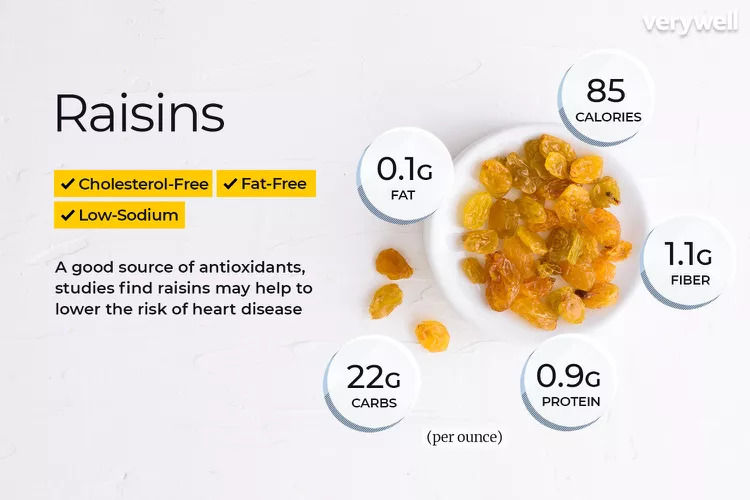Raisins is one of the most popular and well-known dried fruits. As with all dried fruits, raisins are higher in sugar when compared to the total fruit. Sugar doesn’t take many raisins to quickly add up. However, raisins also provide fiber and other health benefits. These raisins are a good way to include fruit into your diet.
Vitamin Raisin Details
The USDA provides the following diet information for 1/2 ounce of dark, seedless raisins.
Energy: 42
Fats: 0g
Sodium: 3.6mg
Carbohydrates: 11g
Fiber: 0.6g
Sugars: 9.1g
Protein: 0.5g
Carbs
Raisins contain 11 grams of carbohydrates per half-ounce (14.4g) compared to grapes of the latest American variety, which only have 2.5 carbs for the same serving size of 6 grapes (14g). Golden raisins have similar carbohydrate, fiber, and calorie counts to dark raisins. Raisins that have seeds contain more fiber and similar amounts of carbs, calories and energy.
While raisins are high in carbohydrates, the sugar they contain is typically fructose which has a lower glycemic indices. The glycemic rating is how much a meal will increase your blood glucose in comparison to pure glucose which has a score of 100. How much a meal raises blood sugar depends on how glycemic the food is, how much you consume, and what you pair it with. The glycemic index tries to combine these concepts, and some diets do so.
According to where you look, raisins have a glycemic range between low and reasonable. Glycemic index can be a complicated concept and different people will react differently to food. People with diabetes who consume too many raisins will experience a significant rise in blood sugar. This is because raisins contain a large amount of carbohydrates.
It is a good idea to use
Raisins contain a small amount of unsaturated fatty acids.
Protein
The raisins contain only a little over 1 gram of proteins per 1-ounce serving.
Vitamins and minerals for nutrition
An oz. A serving of raisins provides 4% of the potassium you need each day. Raisins also contain iron, vitamin C, vitamin B6, and magnesium.
Well being Advantages
Although grapes lose some of their vitamins during the drying process, raisins still contain a lot of antioxidant chemicals, including polyphenols, phenolic acid, and fiber.
Additional Weight Loss Plan
An analysis of data from the National Health and Nutrition Examination Survey 2001-2012 revealed that people who ate raisins generally had a superior diet. The raisins eaters ate more fresh fruits, vegetables, and whole grains. Raisin eaters also had a lower body weight, a lower BMI, lowered waist circumference and were 39% less likely to be obese or overweight. They also had fewer metabolic syndrome symptoms and a 54% less chance of being overweight.
Reduces Coronary Heart Disease Risk
It has also been shown that raisins can reduce your risk of coronary illness.
Helps Intestine Microbiome
Prebiotics such as inulin are present in the dietary fiber in raisins. These prebiotics help to promote the growth of “good” bacteria in the intestine. This can help lower ldl-cholesterol, improve metabolism and immune system function.
Supplies Fast Vitality
During long training periods and races, endurance athletes need fuel in the form of carbohydrates. While raisins are just as effective as sports chews or gels, many athletes turn to them. In a small study, raisins were as effective as sports jelly beans at boosting athletic performance during moderate to high intensity exercise.
Improves Dental Well being
Some of the vitamins found in raisins such as oleanolic, linoleic, and linolenic acids have antimicrobial qualities that can fight the microorganisms that cause dental problems, like cavities and gum disease.
Allergy symptoms
Medical literature has reported rare cases of allergy to grapes and raisins.
Anti-Aggression Results
Because raisins are high in fiber, they can cause digestive distress in those who are sensitive to it (or are not used to eating large quantities). They are also a choking risk for children under 4 years.
Variety
You will usually find dark, seedless raisins in the market. These raisins are made from grapes that have no seeds. Golden raisins are also known as sultanas. You may also find raisins with seeds, which have more fiber than the seedless variety.
They may look like small raisins but they are actually a different fruit. Craisins, which are dried cranberries with added sugars, are often branded as raisins. They are not made from grapes.
Storage and Meals Security
As with other dried fruits, raisins can be stored and transported without refrigeration, unlike some recent fruits. For a few months, you can store them in an airtight container in a darkish and cool place. They’ll keep longer if you store them in the refrigerator.
How to put together
Raisins can be found in many baked goods, cereals and trail mixes. Use them as a topping for salads or to add sweetness and texture in savory dishes like rice pilafs, and other grain-based preparations. To reduce the amount of sugar in your dish, look for raisins that are unsweetened.
Recipes
Try these delicious Raisin Recipes
Low-Carb Path Combination
Oatmeal Raisin Cookie Snack Bites
Moroccan Spiced Chicken with Turmeric Cauliflower Couscous
Granola with Almonds and Buckwheat Applesauce


